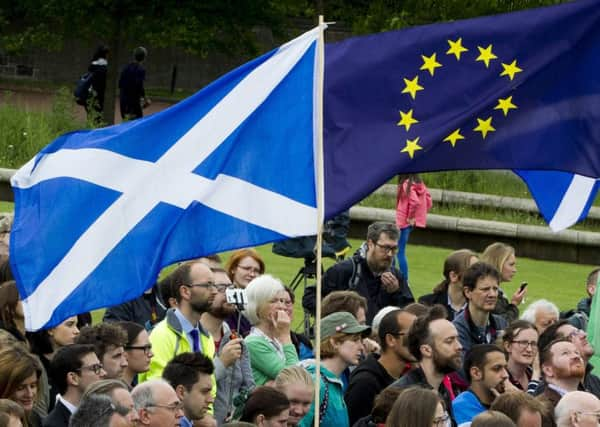Ian Swanson: Brexit battle lines are drawn across the country


Everyone knew the Tories were split on the EU – indeed it was a doomed attempt to end internal Tory tensions which saw David Cameron call the referendum in the first place.
Labour’s divisions were also on show, with some prominent party figures campaigning for Leave and leader Jeremy Corbyn under fire for not campaigning enthusiastically enough to keep Britain in the EU.
Advertisement
Hide AdAdvertisement
Hide AdBut the SNP presented itself as solidly in favour of Remain. Any Nationalist Brexiteers tended to keep their thoughts to themselves and their heads below the parapet. Nicola Sturgeon has dismissed Mr Neil’s claims that he was not alone among the party’s 63 MSPs in voting for Brexit in the privacy of the polling booth.
But she cannot escape the fact that around a third of SNP supporters voted to come out of the EU. Many of those in poorer communities who backed Brexit were the same people who had voted Yes in the 2014 independence referendum, perhaps feeling in both cases the political status quo had let them down and a change offered at least the chance of an improvement.
While putting the case for Scotland to retain its EU links because of the 62 per cent Remain vote her, Ms Sturgeon says she is “acutely aware” that a million Scots backed Leave.
And that could be a significant problem for the SNP if there were to be a second independence referendum. A substantial number of Yes voters from 2014 might not be willing to vote the same way again if it is linked to EU membership.
Advertisement
Hide AdAdvertisement
Hide AdMeanwhile UK-wide, last week’s court ruling that Theresa May cannot trigger Article 50 without approval from parliament – which the Supreme Court is expected to endorse – has intensified the passions at play.
Headlines branding the three judges as “Enemies of the People” shows just how bitter feelings on the issue continue to be.
But despite the outrage of some of the Brexiteers, it seems unlikely the ruling will see MPs try to vote down the referendum result or block the triggering of Article 50.
Most of those who campaigned for Remain accept the voters’ verdict went against them and will swallow hard and walk through the lobbies to start the Brexit process.
Advertisement
Hide AdAdvertisement
Hide AdThey know if they openly flouted the will of the electorate they would almost certainly pay for it at the next election.
That does not mean, however, that they will allow Mrs May and her colleagues to do as they like. Many MPs on all sides are unhappy with the lack of information coming from the Government on how they see Brexit.
No-one is asking them to give away their negotiating tactics, but people are entitled to know what the Government’s objectives are. And that must mean more than ministers insisting that they want “the best deal possible”.
There are said to be 20 to 30 Conservative MPs willing to work with MPs from other parties to minimise the damage of withdrawal from the EU. Mrs May’s small majority in the Commons means there is more scope for pressing her to accept changes and modifications to her plans.
Advertisement
Hide AdAdvertisement
Hide AdNo doubt divisions over Brexit will persist, but more openness about what the Government is seeking could help remove some of the bitterness and suspicion from the debate.